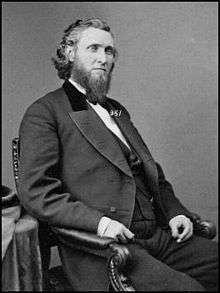Dudley M. DuBose
| Dudley M. DuBose | |
|---|---|
 | |
| Member of the U.S. House of Representatives from Georgia's 5th district | |
|
In office March 4, 1871 – March 3, 1873 | |
| Preceded by | Stephen A. Corker |
| Succeeded by | James C. Freeman |
| Personal details | |
| Born |
Dudley McIver DuBose October 28, 1834 Memphis, Tennessee, U.S. |
| Died |
March 2, 1883 (aged 48) Washington, Georgia, U.S. |
| Political party | Democratic |
| Spouse(s) | Sallie Toombs |
| Children |
Robert Toombs DuBose Camille DuBose Dudley DuBose Louisa Toombs DuBose |
| Occupation | Lawyer, Politician, |
| Military service | |
| Allegiance |
|
| Service/branch |
|
| Years of service | 1861–1865 (CSA) |
| Rank |
|
| Battles/wars | American Civil War |
Dudley McIver DuBose (October 28, 1834 – March 2, 1883) was a lawyer, soldier, and a U.S. Representative from Georgia.
Early life
Dudley McIver DuBose was born in Shelby County, Tennessee to Alfred Bishop Cassells DuBose and his wife. He attended the University of Mississippi at Oxford, and graduated from the Lebanon Law School (in Tennessee) in 1856. He was admitted to the bar in 1857 and commenced the practice of law in Memphis, Tennessee. He moved to Georgia not long afterwards. On April 15, 1858 he married Sallie Toombs the daughter of United States Senator Robert Toombs. Early in their marriage the couple moved to Augusta, Georgia where he DuBose practiced law.
Civil War
DuBose served in the Confederate States Army during the Civil War, at first in the 15th Georgia Volunteer Infantry Regiment. Du Bose's regiment, served initially in the brigade of BG Robert A. Toombs, his father-in-law. The regiment fought in the Seven Days Battles, the Second Battle of Bull Run and the Battle of Antietam. In January 1863 he was promoted to the rank of colonel to command of the regiment. DuBose and his Georgians served under BG Henry L. Benning in MG John B. Hood's division of James Longstreet's corps, including in the Siege of Suffolk. At the Battle of Gettysburg on July 2, 1863, his regiment participated in Hood's attack on the Union III Corps, fighting at Devil's Den.
In September 1863 DuBose led his regiment at the Battle of Chickamauga, where he was wounded, and in the Knoxville Campaign. Longstreet's corps returned to Virginia in 1864. DuBose saw combat at the Battle of the Wilderness, in May 1864, and temporarily led Benning's brigade in the Battle of Spotsylvania Court House and the Battle of Cold Harbor. On November 16, Du Bose was promoted to brigadier general and command of a brigade in MG Joseph B. Kershaw's division, taking the place of BG William T. Wofford. He led his brigade in the later stages of the Siege of Petersburg and the Appomattox Campaign. On April 6, 1865, he was captured in the Battle of Sailor's Creek while serving in Kershaw's division.
Postbellum career
Following the war, DuBose moved to Washington, Georgia. He was elected as a Democrat to the Forty-second Congress (March 4, 1871 – March 3, 1873). Afterwards he resumed the practice of law.
He died in Washington, Georgia, and was interred in Rest Haven Cemetery.
See also
References
- Eicher, John H., and David J. Eicher, Civil War High Commands. Stanford: Stanford University Press, 2001. ISBN 978-0-8047-3641-1.
- Sifakis, Stewart. Who Was Who in the Civil War. New York: Facts On File, 1988. ISBN 978-0-8160-1055-4.
- Warner, Ezra J. Generals in Gray: Lives of the Confederate Commanders. Baton Rouge: Louisiana State University Press, 1959. ISBN 978-0-8071-0823-9.
- United States Congress. "Dudley M. DuBose (id: D000510)". Biographical Directory of the United States Congress. Retrieved on 2008-02-13
![]() This article incorporates public domain material from the Biographical Directory of the United States Congress website http://bioguide.congress.gov.
This article incorporates public domain material from the Biographical Directory of the United States Congress website http://bioguide.congress.gov.
External links
- Dudley McIver DuBose Find A Grave
| United States House of Representatives | ||
|---|---|---|
| Preceded by Stephen A. Corker |
Member of the U.S. House of Representatives from Georgia's 5th congressional district March 4, 1871 – March 3, 1873 |
Succeeded by James C. Freeman |